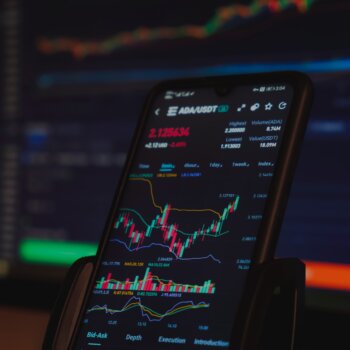Stephen Fisher takes a non-traditional view on investment.
What’s your story?
I am currently Principal and CIO of First Degree Global Asset Management Pte Ltd in Singapore. Prior to that I worked for JP Morgan Asset Management for 18 years where I was Regional Head for Fixed Income Product Asia-Pacific. I completed a PhD in Finance in 1992 and have been in research and portfolio management ever since
What is your involvement with Investment?
Finance is in my blood. I started investing at the age of 7 years, spent my school vacations at the Stock Exchange trading for my personal account and decided to study the science of investing in order to know as much about the field as I could. I spent my time at JPMorgan Asset Management trying to introduce modern methods into a traditional investment process. In 2011, my partners and I decided to start our own firm to pursue a non-traditional strategy that is truly unique.
How did that come about?
Non-traditional investing is quantitatively rigorous and I have been researching what determines the ‘risk premium’ for 30 years. The Global Financial Crisis was misinterpreted by traditional investors as driven by default risk. Our non-traditional view focused on investors’ attitude towards taking risk – this is called ‘risk-aversion.’ Traditional investors during the GFC sold out cheaply since they feared economic collapse. Our non-traditional approach bought cheap assets instead by providing liquidity to an increasingly risk-averse market. Hindsight favours our interpretation.
We set up First Degree in 2011 to offer this strategy to the broader investment market.
What are some of the key things you have learnt about Investing?
The PhD taught me that most of what we observe in financial markets, perhaps 90%, we don’t really understand. I am constantly amused by the newspapers and commentators who try to explain every market move somehow rather than just admitting that ‘…we don’t know…’ Noise, or market randomness, is all around us which makes investing extremely difficult. The corollary is, that if you can find a systematic, structural pattern within the markets then you can make a lot of money.
What mistakes do you see less experienced investors making?
Inexperienced investors often think that investing is easy and just start buying or selling stuff without a plan. Would you build a house without a plan? Inexperienced investors have a gung-ho attitude that inevitably gets them into a small number of concentrated positions, taking unnecessary risks for no return.
By plan I mean you need to start with an overall strategic objective and then allow limited tactical deviations. The strategic allocation to the various asset classes is critical since this determines 95% of the long run return. Tactical trading attempts to identify ‘alpha’. Alpha is uncorrelated sources of return which are very difficult to find. I would recommend most investors not to try to make alpha.
Experienced investors understand that making alpha is hard, that it requires patience and a niche, and that every little basis point earned is sacred.
What mistakes do you see Entrepreneurs making?
Entrepreneurs underestimate the value of distribution. It’s one thing to have a great product but it’s another thing to find customers and sell it. Distribution strategies need to be factored in and pursued from day one. Generating cash asap will keep you in the game.
What’s the best piece of advice you ever received?
My first boss at JPMorgan in New York dispatched me off to Australia with the advice “…take a few risks.”
What advice would you give to those seeking funding?
Focus on what you have done rather than what you want to do. Proof statements are worth much more than business plans and wish-lists.
Who inspires you?
Shane Warne – the greatest spin bowler of all time and a radical, rebellious, anti-establishmentarian.
What have you just learnt recently that blew you away?
Apparently, the most commonly used technique in Artificial Intelligence is linear regression!!! This method has been around for centuries and it means I have been using AI all my life without even knowing it! It’s great to see that statistical methods are now achieving broad acceptance and adoption in our everyday life.
It also means that the term ‘Artificial Intelligence’ is a great misnomer – there is nothing ‘artificial’ nor ‘intelligent’ about linear regression (nor any of the other techniques used in AI). The AI-craze is largely marketing hype.
What business book do you recommend the most?
“A non-random walk down Wall Street” by Lo and MacKinlay is my favourite finance book since it sets out the foundations for active decision making. This is a modern response to Bert Malkiel’s “A random walk down Wall Street” that was critical of all active strategies. The point of Lo and MacKinlays’ work is that financial markets display a much richer statistical structure than the simple tests undertaken by the pioneers of modern finance would have us believe. This can be exploited for profit.
Shameless plug for your business/organisation:
First Degree Global Asset Management offers a truly unique, long-horizon investment strategy which has performed consistently for over 8 years. We exploit the well established phenomenon that forecasts power for the risk-premium using observable market variables is increasing in the time horizon.
First Degree also holds a Capital Markets Services licence issued by the Monetary Authority of Singapore and offers a licensing platform for fund managers who seek to locate their operations in Singapore.
How can people connect with you?
Website: www.firstdegree.asia
Email: [email protected]
Phone: +65 9841 2002
Social Media profiles?
My blog: http://www.firstdegree.asia/the-first-degree-view
Investing videos: https://www.youtube.com/channel/UCFsYzq3Oq9VYHr2-YI76W6Q
Google search “stephen fisher first degree”
—
This article is part of the World Business Angel Forum media partnership with AsianEntrepreneur.org
If you would like more information about WBAF, please contact Callum Laing WBAF High Commissioner for Singapore. [email protected]
































